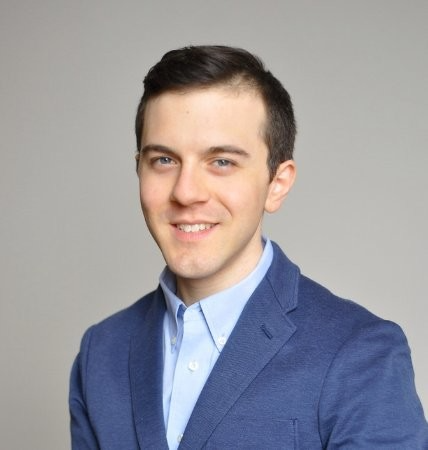
What did you study at Yale, and what is your current profession/job?
At Yale, I was in the Microbiology track of the Biological and Biomedical Science (BBS) Program, and I studied ribosome assembly in the Baserga Lab. Ribosomes are cellular machines that play an essential role in translating the information stored in our DNA into functional proteins.
After Yale, I attended New York University (NYU) School of Law and graduated in 2020. I am currently a patent attorney at Morrison & Foerster, LLP working primarily in the life sciences area. In June, I will be starting a position as a law clerk for a federal judge on the United States Court of Appeals for the Federal Circuit. Clerking is typically 1-2 years, and many students do it either right after graduating law school or after working for a short period after graduating law school.
What do you like most about your current role? What do you find most challenging and/ or rewarding?
I love how much science I use and encounter on a daily basis. It is so interesting to hear from inventors who want to protect their inventions, to hear about the effort that went into their discoveries, and to provide advice and counseling on how to protect those advances.
It can be challenging and intimidating to delve into an area of science that is less familiar, particularly when the inventors are trusting us to provide a robust and complete legal protection.
How did your time at Yale shape your career trajectory?
My coursework, lab work, and time in student groups all worked together to shape my career trajectory. My coursework and lab work established a firm basis in graduate-level science, and my time in student groups provided many opportunities to develop professional skills. I also had the opportunity to serve as a part-time intern with a local law firm during my sixth year, working under an attorney in the law firm whose practice focused on the biological and biomedical side of patent law. These experiences made me realize I wanted to pursue a career that was heavy on science, but that was more in a professional, rather than an academic, setting. The internship sealed the deal for me in terms of attending law school to become a patent lawyer.
What are the main skills that you acquired as a PhD student which help make you successful in your current career?
There are three main skills I acquired as a PhD student that help me in my current career. First is a proficiency in science. During my PhD, I learned incredible amounts about my area of research, but I also learned how to think more broadly about science and research that fell outside of my precise research area. This also helped me develop the second skill I developed—an ability to think critically and in depth about science. Finally, I developed a sense of professionalism and collegiality through working with my lab mates and in several student-run groups.
Did you acquire any professional experience related to your line of work while in graduate school?
During my time at Yale, I served as co-Editor-in-Chief of the Yale Journal of Biology and Medicine (YJBM) and as Chair of the Graduate Student Assembly (GSA). Both experiences provided me with concrete professional experience that has transferred well to working in a law firm. For example, communicating with authors and reviewers at YJBM and with upper-level administrators in GSA has helped me in transparently and professionally communicating with my superiors and also with clients of the firm. The work in these groups also helped me to develop a strong sense of teamwork, including working with groups of people who have fundamental disagreements about a particular path forward.
What advice would you offer PhDs who are interested in your line of work?
Talk to people who have taken the path! Obtaining a professional degree after spending 5-7 years in a Ph.D. program can be intimidating, but it can also be the right choice if it is something that really piques your interest.
There are often internship opportunities available to learn more about patent law and to see whether it is a viable and interesting career path for you. In particular, look for opportunities with law firms and even at Yale, for example, in the Office of Cooperative Research.
